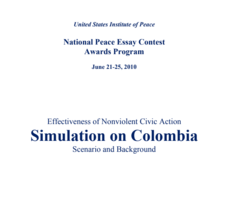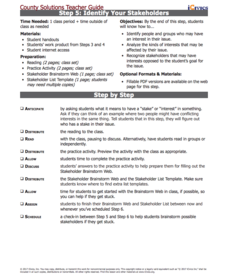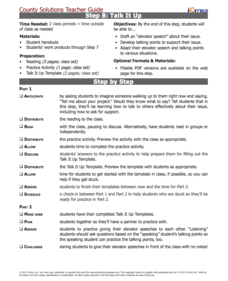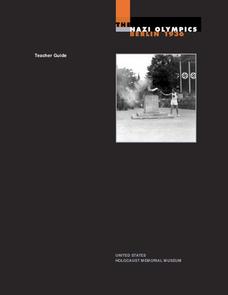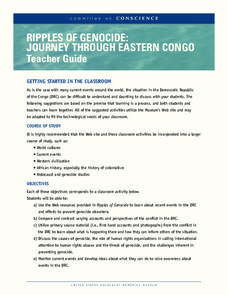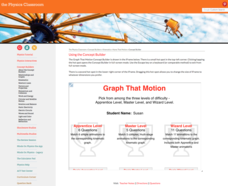Howard Hughes Medical Institute
Mass Extinctions Interactive
Extinctions constantly occur, but what sets off a mass extinction event? Young scientists study the data from the previous five mass extinctions to better understand their causes. Then, they learn the impact each extinction had on our...
US Institute of Peace
Effectiveness of Nonviolent Civic Action Simulation on Colombia
With new leadership comes new hope! After years of violence, the people of Colombia elect a new president ... could this mean an end to conflict? Civics scholars take part in a large group role-playing exercise designed to illustrate the...
US Department of Energy
Electric Avenue: Parallel and Series Circuits
Can you infer the wiring diagram of a series of lights based on their behavior alone? Scholars work with multiple boxes of four lights. They must flip the switch and decide how the lights are wired. By applying their knowledge of...
Physics Classroom
Free Fall
Scholars must understand freefall before they learn how objects like airplanes fly. They apply knowledge of velocity and acceleration to predict speed and direction as part of a larger series on vectors and projectiles.
iCivics
Step 5: Identify Your Stakeholders
Have you ever had a goal, but needed help achieving it? Scholars analyze the purpose of stakeholders in the fifth installment of a 10-part County Solutions - High School series. They investigate finances, personal concerns, geography,...
iCivics
Step 7: Fill the Holes
It's time to communicate without using emojis or hashtags! In the seventh step of a 10-part County Solutions - High School unit scholars analyze professional communication when accomplishing a goal. They use examples, research, and data...
iCivics
Step 8: Talk It Up
You have 30 seconds to sell your idea ... go! Scholars master the art of the elevator pitch in the eighth step of a 10-part series. They use research, practice, and step-by-step planning to gain a better understanding of the method....
US Holocaust Museum
Nazi Olympics: Berlin 1936
The Olympics are about more than sports—at times, the games are also a place of racism and prejudice! Pupils investigate the 1936 Olympics in Berlin, Germany. They analyze the meaning behind the materials included in the United States...
US Holocaust Museum
Ripples of Genocide: Journey through Eastern Congo
Could you locate the Democratic Republic of Congo on a map? Scholars investigate the genocide taking place in Eastern Congo. Groups explore web-based evidence as well as the Ripples in Genocide source to take a closer look at the issue....
Constitutional Rights Foundation
The War of 1812: America’s First Declared War
Free Trade and Sailor's Rights! Pupils dive into America's first declared war, the War of 1812. They analyze the presidencies of Jefferson and Madison through diary entries and historical reasoning. To conclude the lesson, they use their...
PBS
Racial Equality: How Far Have We Come and How Far Do We Have To Go?
Is everyone treated fairly in America? The culminating fifth lesson from a series of five has pupils explore racial inequalities from the 1960s and decide whether or not society has changed over time. The lesson comes with a speech from...
Serendip
A Scientific Investigation – What Types of Food Contain Starch and Protein?
You are what you eat, as they say! Are you more starch or more protein? Young scholars use their knowledge of each component to test different foods for their content. Using multiple indicators, individuals describe the protein and...
Constitutional Rights Foundation
Conservation, Preservation, and the National Parks
Going green? Scholars investigate the creation of the US National Park program. Through diary entries as well as expert testimony, they synthesize information and analyze the need for conservation and preservation. Finally, they display...
Howard Hughes Medical Institute
Neural Control of Walking and Running
Physical therapists state that relearning how to walk often motivates stroke and brain injury patients. Researchers spend a great deal of time focused on understanding the neural control required for walking. They pass along that...
Physics Classroom
Resistance Ranking Tasks
Resistance is not futile ... it is voltage divided by current. Scholars apply their knowledge to a series of ranking puzzles. First, they consider wires of varying lengths and then wires of varying cross-sectional areas. Finally, they...
Physics Classroom
Series Circuits: ∆V=I•R Calculations
Better than some television series, parallel series circuits provide practice for calculations. Scholars work through a series of problems, each progressively more difficult. They apply knowledge of voltage calculations, resistors, and...
Physics Classroom
Graph That Motion
Pupils apply their knowledge of the shape and slope of graphs to interpret the motion of an object. Three levels of difficulty provide plenty of practice with support thanks to the "Help Me!" button offered with each question.
Physics Classroom
Position-Time Graphs - Conceptual Analysis
Increasingly, colleges and employers want applicants with strong conceptual analysis skills, so give them some practice! Applying these skills to position-time graphs encourages synthesis of knowledge. To complete an installment of a...
American Psychological Association
Statistical Significance
Our survey says ...! High school psychology scholars analyze how people create surveys. Three different scenarios help them discover the meaning behind statistical significance. Armed with new knowledge, novice psychologists uncover what...
NET Foundation for Television
1850-1874 Native Americans and Settlers
Did Western settlers receiving free land from the Homestead Act realize it wasn't really free at all? Scholars investigate the impact Western expansion had on Native American culture in the mid-1800s. They use documents, timelines, and...
NET Foundation for Television
1850-1874 African American Settlers
Go West, young man! Scholars investigate the impact of African American settlers moving to the Nebraska territory, following the passage of the Kansas-Nebraska Act in the mid 1800s. Using primary sources, timelines, maps, and...
Physics Classroom
Being Impulsive About Momentum Change
Scholars quantitatively apply their knowledge relating impulse, force, and time in the collision of objects. Three progressive levels challenge pupils with different ways of analyzing these problems. They identify multiple collision...
Physics Classroom
Acceleration
The acceleration rate of a flea jumping works out to 50 times faster than the acceleration rate of the space shuttle. Pupils apply knowledge of acceleration to dot diagrams, velocity-time tables, and word problems. They solve for...
Mascil Project
Building a Safe Staircase
Climb up the staircase of engineering knowledge. After watching a video of a carpenter measuring out steps for a set of stairs, pupils learn about the terminology and regulations involving stairs. They see how to use a rule of thumb when...
Other popular searches
- Core Knowledge
- General Knowledge
- Core Knowledge Foundation
- Activating Prior Knowledge
- Core Knowledge Reading Program
- Prior Knowledge
- Depth of Knowledge
- Core Knowledge Lesson Plans
- General Knowledge Quiz
- Background Knowledge
- Core Knowledge Lessonplans
- Knowledge of Literary Symbol

